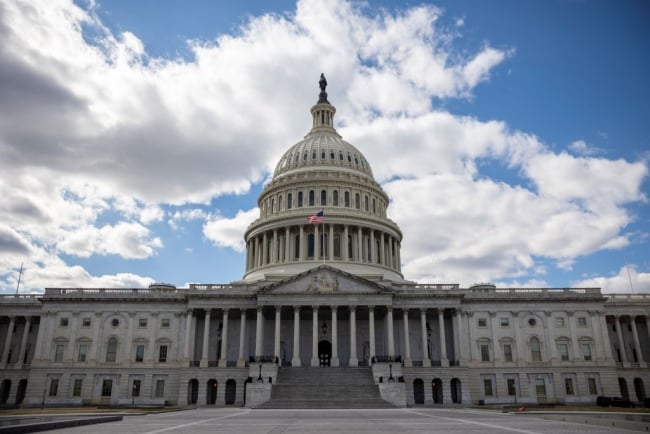You have /5 articles left.
Sign up for a free account or log in.

Xinhua News Agency/Getty Images
A bipartisan bill introduced last week would add new guardrails around income-share agreements, a student aid alternative that, until recently, had limited federal oversight.
ISA lenders and consumer advocates alike have been calling for clarification on the legal rules they must follow since the Education Department clarified in March that ISAs are considered private student loans. The announcement from the department subjected ISAs to the same set of consumer protection laws as private student loans. However, since ISAs, which are based on a student’s income, are different from traditional private student loans, ISA providers have been confused on how to interpret these laws.
The ISA Student Protection Act would essentially create a separate regulatory system tailored to ISAs. The bill was introduced by Senators Mark Warner, a Democrat from Virginia; Todd Young, a Republican from Indiana; Marco Rubio, a Republican from Florida; and Chris Coons, a Democrat from Delaware.
“Income-share agreements are a promising way to finance postsecondary education and an attractive alternative to private student loans and PLUS loans. ISAs are also proving to be uniquely responsive to the needs of students who are ineligible for existing federal student aid programs,” said Warner in a statement. “There are students across the country who are already benefiting from ISAs and deserve the safeguards and certainty the ISA Student Protection Act of 2022 would provide.”
The bill is supported by companies that oversee ISA programs, but critics of ISA programs are skeptical that the bill will prevent bad actors from rising in the industry.
Expanded Consumer Protections for ISAs
In a nutshell, ISAs are contracts offered by companies or colleges that cover a portion or the entire cost of attendance for college. In exchange, the student pays a percentage of their postgraduation income for an arranged period of time. They are most commonly offered in technical training programs, boot camps and by some colleges that either offer the programs themselves with institutional funding or in partnership with companies.
Supporters of ISAs have argued that they are a financial aid alternative that keeps college students out of the private student loan market. On the other hand, critics argue that they can be predatory and in some cases can lead to students taking on more debt than they would have through traditional loan programs.
“ISAs are a tool. They’re just a tool, and you can build problematic programs with any tool,” said Kevin James, chief executive officer at Better Future Forward, a nonprofit that offers ISA programs to students in Illinois, Minnesota and Wisconsin. “Just like any tool, we need proper regulatory oversight. I think we should be creating stronger consumer protections.”
Many attempts to expand consumer protections around ISAs through the ISA Student Protection Act have been introduced in Congress since 2015. However, none have been signed into law. The bill in its current form is seen by both critics and supporters of ISAs as one of the best versions of the bill, but ISA skeptics do not think the bill will do enough.
“If you compare it to prior iterations of the bill, it is much more powerful,” said Ben Kaufman, the director of research and investigations at the Student Borrower Protection Center. “We just think ISAs are … very horrendous, poorly thought out and predatory."
In September the Consumer Financial Protection Bureau determined that ISAs were private student loans. In March, the Education Department further clarified this interpretation, subjecting ISAs to a new set of consumer protections. ISA providers said they were happy to see that the bill would clarify how consumer protection law applies to ISA.
Ethan Pollack, a director at Jobs for the Future, an organization that both advocates for the use of ISAs in higher education and supports the bill, described the current legal landscape as “trying to pound a square peg into a round hole.” He continued, “We have laws and regulations that are really designed … for traditionally structured loans.”
The bill would create a separate regulatory system under consumer protection law that is specifically designed for ISAs. It would also clarify that ISAs must follow consumer protection laws such as the Fair Credit Reporting Act and the Equal Credit Opportunity Act and add additional clarifications for how these laws would specifically apply to ISA programs.
James said current law “makes it hard for good programs to thrive and help students, because they are dealing with a legal regime that wasn’t built for these types of tools.”
The bill also creates protections if a student’s income becomes too low to manage their ISA payment. Under the bill, ISA providers would be prohibited from requiring borrowers to pay more than 20 percent of their annual income. It would also prevent borrowers from making payments during periods of low income, defined as 300 percent of the federal poverty line, or just over $40,000 a year. Contracts would be prohibited from exceeding 240 monthly payments and must expire after 360 months, regardless of the amount of debt outstanding.
If a borrower is considered low income, the bill would require ISA providers to suspend payments for at least three months for every 30 payments made. Additionally, a borrower’s payments would be suspended if a borrower’s monthly payment caused their monthly income to fall under 200 percent of the federal poverty level.
ISA providers welcome these reforms that they say will ensure students are taking on manageable financial burdens and prevent bad actors in the industry from requiring students to pay too much of their income.
Disclosures for ISAs
Some students find it difficult to understand what exactly they are agreeing to when they enter ISA contracts. Critics of ISA programs have also argued that lack of front-end transparency in ISA lending has put many students in a situation where they cannot meet the terms of the agreement. The bill would create new disclosure requirements for ISAs to help prevent such situations in the future.
The bill directs the Consumer Financial Protection Bureau to create a standardized format for ISA providers to disclose details of the agreement to prospective borrowers, including the number of payments a borrower can expect to pay, how much their payment would be at different income levels and the length of the agreement.
Elements of these disclosures model the Truth in Lending Act, such as the requirement to provide comparisons of the ISA agreement to other loan options. Supporters of the bill say this would help borrowers make more informed decisions about entering an ISA. The bill would also extend disclosure requirements in preferred lender rules, where a college provides information to students on the list of lenders they recommend, to ISAs.
The bill would also give the CFPB regulatory authority over ISAs. This would open the door for the bureau to develop additional regulations specific to ISAs to be rolled out in the future.
“It would actually give [the Consumer Financial Protection Bureau] in many ways more latitude, because they would no longer be bound by the traditionally structured loan concept, and so they could potentially think more creatively about what that compliance looks like compared to what is currently on the books,” said Pollack.
Increased Oversight and Reporting
There is no data available on how many students are enrolled in ISA programs nationally. In addition, there is no federal oversight on student outcomes from these programs.
The bill would include safeguards for students who entered an ISA agreement but received low-quality education by requiring ISA agreements to include language that says students have the right to decline repayment if the education they received was fraudulent.
Pollack said that designating the CFPB to oversee ISA regulation could open the door for increased reporting on ISAs on a federal level.
Division Over the Bill
Supporters of the bill include organizations like Jobs for the Future, the Invest in Student Advancement Alliance and the Student Freedom Initiative, along with big names in the ISA industry such as Purdue University.
In June, Purdue paused new enrollments in its ISA program, Back a Boiler, due to what the college said was a technical matter. The program was created in 2016 as an alternative to Parent PLUS or private student loans and enrolled more than 1,900 students and allocated $21 million to fund their educations. Some graduates of the program have claimed it left them with large amounts of debt.
The Student Borrower Protection Center sent a letter to the Education Department in March alleging that Purdue University’s ISA was illegal. Purdue responded to the letter denying the allegations.
Purdue has stated that it is supportive of the bill. “This bill provides exactly the kind of legislative framework Purdue has been advocating for years,” said Mitch Daniels, president of Purdue, in a statement on the bill. “Much of the confusion surrounding ISAs has been caused by the absence of clear federal standards, and this bill goes a long way toward filling that gap.”
Kaufman said, “This bill is a total disaster,” and it “enshrines into law all the worst aspects of ISAs that are much more central to the business model.”
Although the bill has bipartisan support, some Democrats have been outspoken about the issue of ISAs. In 2019, Senator Elizabeth Warren of Massachusetts, along with Democratic colleagues in the House of Representatives Ayanna Pressley of Massachusetts and Katie Porter of California, sent letters to seven four-year colleges offering ISA programs.
In the letter they said, “We are concerned about ISAs because, like private student loans and many other types of debt, the terms of ISA contracts can be predatory and dangerous for students, and ISAs have received little federal oversight.”




